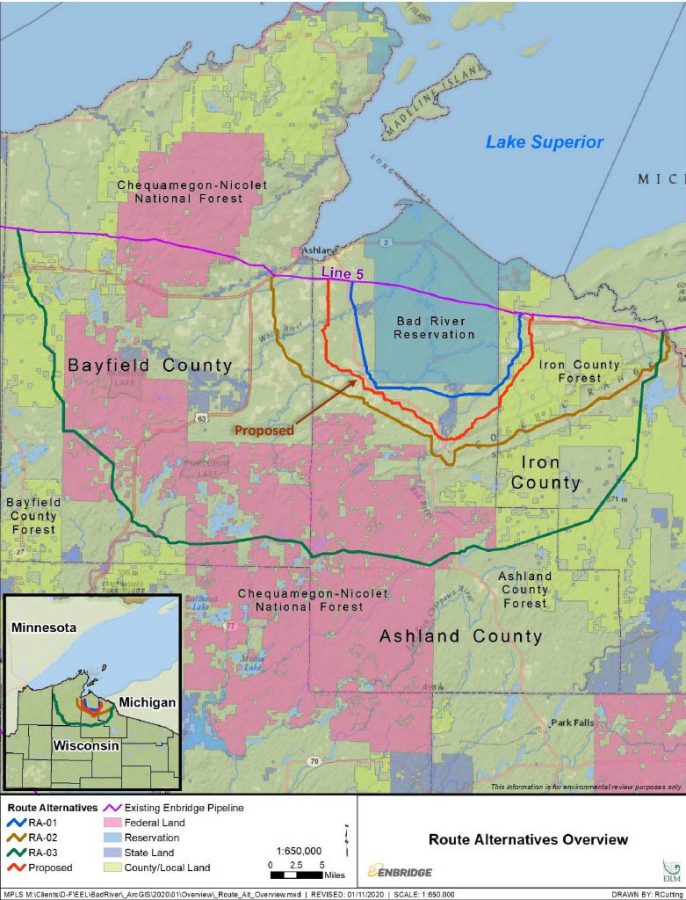Line 5, An American Energy Discourse
In recent months, ConocoPhillips’—a large, American-based petroleum refinery corporation— Willow Project, a decades-long oil drilling venture on Alaska’s North Slope in the National Petroleum Reserve, was approved by President Joe Biden and The White House. The controversial approval has gained notoriety in the past 12 months, but the protest over the continued approval of oil and gas drilling permits is nothing new.
For decades, climate activists have opposed the issuance and re-issuance of permits granting approval to oil and gas companies to drill for oil and gas here in the states by the Federal Government. This has caused a massive flood of opposition from climate activists, ranging from teenagers mobilizing on social media and online petitions to some of the most outspoken climate activists in Congress. The decision regarding the Willow Project and the national attention it received may have more local implications than most may realize.
Wisconsin is home to portions of the 645 mile long oil pipeline known as Enbridge Line 5. Line 5 isn’t new, nor has it just been recently approved. In fact, it was originally built 70 years ago, in 1953. Despite its old age, the pipeline is still greatly controversial, and, like the outcry after the approval of the Willow Project, Line 5 also attracts significant online social media and climate activists’ attention.
Here in Wisconsin, U.S. Representative Tom Tiffany, a Republican who represents Northern Wisconsin (including the land where Line 5 resides) in Washington, is an avid supporter of Line 5 along with what he calls, “Energy Independence.” Tiffany is a house natural resource committee member and has made expanding access to affordable and efficient energy a key legislative goal.
“When you see America be strong [and] when America is prosperous, it’s when we have affordable energy. […] Line 5 is a critical piece of energy independence in the Upper Great Lakes state,” Tiffany says.
Tiffany believes that, despite what is being shown by national and social media activists, both of these pipelines keep their surrounding communities alive and thriving. Tiffany and many other Line 5 supporters agree that the energy we receive through projects such as Willow and Line 5 are actually more environmentally friendly and realistic for regular usage compared to other comparable energy sources like wind and solar.
“[Line 5] is critical for people to heat their homes, run their automobiles, and all the rest. […] Our natural gas burns 40% cleaner than other nations. It’s all about trade-offs. While people want to transition to wind and solar, it’s gonna take a while to get there, if we ever get there,” Tiffany says. “Why not burn the most clean burning fuel which at this point is natural gas? I believe in an all of the above approaches when it comes to producing energy, you can’t simply say we’re going to stop using fossil fuels, and think that America is going to continue to be strong, prosperous and free. Because we won’t.”
Brett Korte, an attorney for Clean Wisconsin, a Wisconsin-based environmental law group, is committed to fighting projects like Line 5 in court and trying to get them shut down. They believe that these projects do, in fact, have a large, irreversible, and negative environmental impact in Wisconsin and the greater Great Lakes Region.
“[Line 5 is] going to emit nearly 30 million tons of greenhouse gasses per year in operation. We believe it’s time to move away from fossil fuels, and approving this reroute is just expanding a project that really needs to be rethought, ” Korte says.
Differing from Tiffany’s belief that Line 5 and other oil and gas ventures keep local communities thriving, Korte explains how shifting to a carbon-neutral grid would not just save Wisconsites money, but would create new jobs and boost the local, state, and national economy simultaneously.
“When it comes to renewable energy, they really help support the whole economy. […] We can have a homegrown and independent energy economy in Wisconsin, whereas we’re currently importing all the fuels that we have, and that means that all those jobs are somewhere else. By bringing that stuff to Wisconsin and generating our own renewables, it really is an opportunity for good paying jobs all over the state in an industry that is helping Wisconsin,” Korte says.
Korte believes that Line 5 and the Willow project both pose large dangers to surrounding communities and that their drilling licenses should be revoked. Korte, Clean Wisconsin, and most climate activists are working to shift America’s dependency from fossil fuels, including the gas and oil being transported by the Willow Project in Alaska and also Line 5 here in Wisconsin.
“We are telling the DNR to take a hard look at all the impacts of Line 5 on the local environment. It’s going to cross dozens of bodies of water, cross hundreds of acres of wetland, and it’s obviously a major spill threat,” Korte says.
The future of America’s energy dependency is ever-changing. Although they have vastly different approaches, both Tiffany and Korte are committed to doing what they believe will ensure Wisconsinites have access to efficient and affordable energy while still keeping local communities and environments safe.

Simon is a senior, and this is his third year on staff! He is the publication’s Editor-in-Chief this year! Simon joined the Norse Star his sophomore...






